Business Law: Legal System Evaluation, Impact Assessment & Solutions
VerifiedAdded on 2024/06/28
|22
|5129
|268
Report
AI Summary
This report provides a comprehensive overview of the legal system in the context of business, focusing on the UK legal framework. It begins by explaining the sources of law and the role of government in law-making, including the application of statutory and common law. The report evaluates the effectiveness of the legal system, referencing recent reforms and developments. It illustrates the potential impact of company, employment, and contract law on businesses with specific examples, differentiating between regulations, legislation, and standards. Furthermore, the report suggests appropriate legal solutions for various business problems, such as contract termination, insolvency, and liquidation, assessing the positive and negative impacts of these solutions. Finally, it recommends legal solutions based on different legal systems, comparing their effectiveness and critically evaluating their use in comparison with alternative legal advice. The document is contributed by a student and is available on Desklib, a platform providing study tools for students.
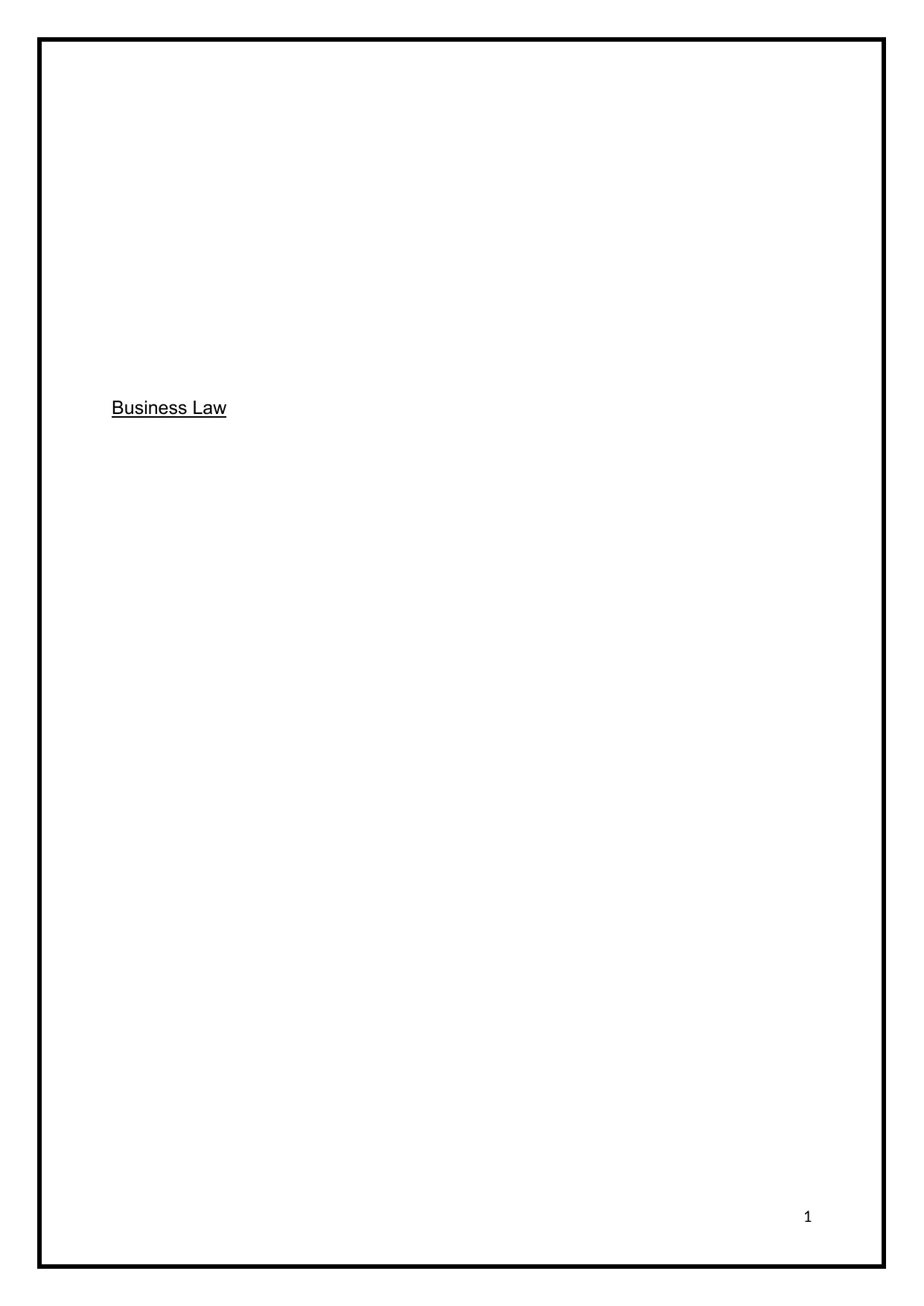
Business Law
1
1
Paraphrase This Document
Need a fresh take? Get an instant paraphrase of this document with our AI Paraphraser
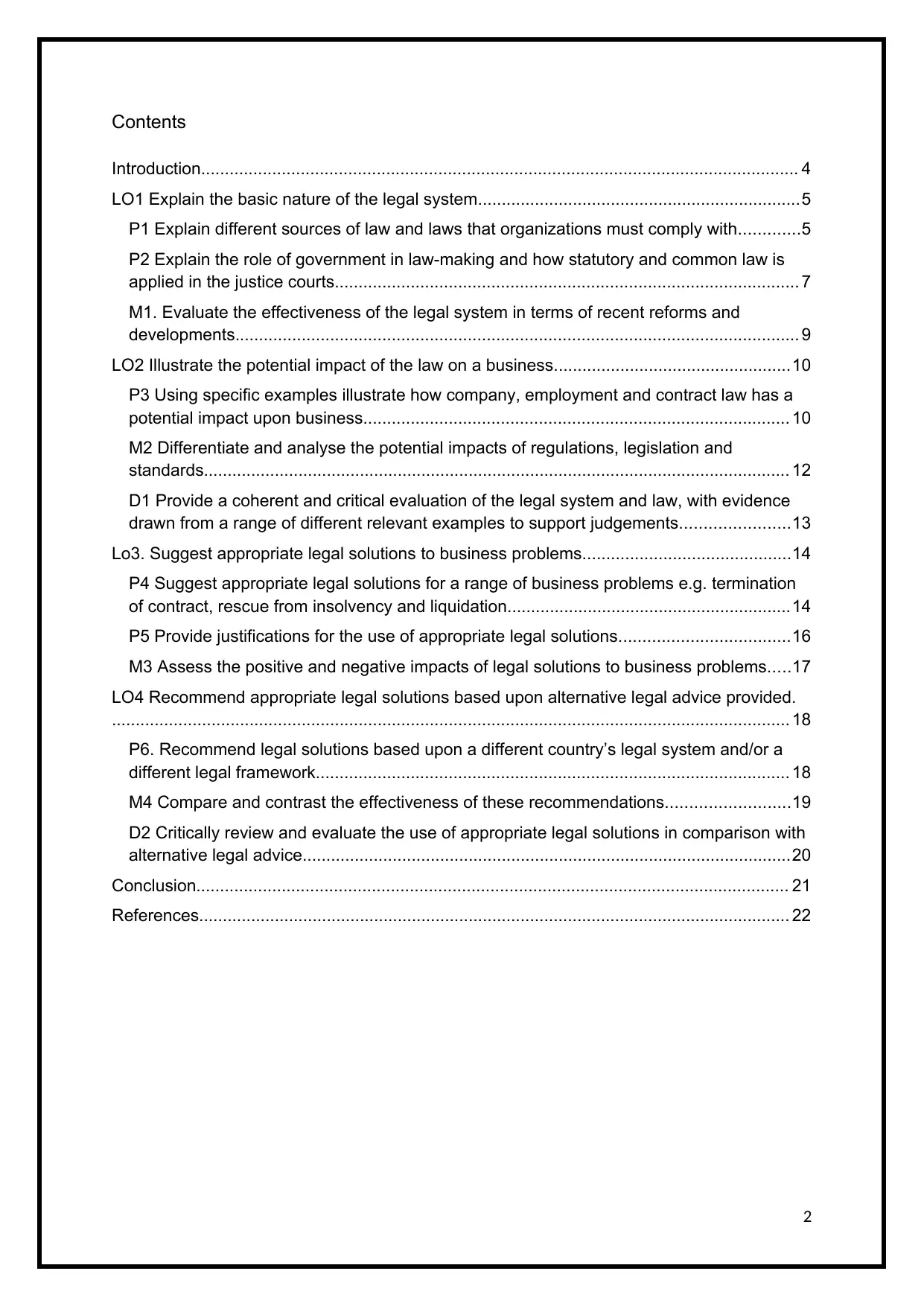
Contents
Introduction.............................................................................................................................. 4
LO1 Explain the basic nature of the legal system....................................................................5
P1 Explain different sources of law and laws that organizations must comply with.............5
P2 Explain the role of government in law-making and how statutory and common law is
applied in the justice courts.................................................................................................. 7
M1. Evaluate the effectiveness of the legal system in terms of recent reforms and
developments....................................................................................................................... 9
LO2 Illustrate the potential impact of the law on a business..................................................10
P3 Using specific examples illustrate how company, employment and contract law has a
potential impact upon business.......................................................................................... 10
M2 Differentiate and analyse the potential impacts of regulations, legislation and
standards............................................................................................................................ 12
D1 Provide a coherent and critical evaluation of the legal system and law, with evidence
drawn from a range of different relevant examples to support judgements.......................13
Lo3. Suggest appropriate legal solutions to business problems............................................14
P4 Suggest appropriate legal solutions for a range of business problems e.g. termination
of contract, rescue from insolvency and liquidation............................................................14
P5 Provide justifications for the use of appropriate legal solutions....................................16
M3 Assess the positive and negative impacts of legal solutions to business problems.....17
LO4 Recommend appropriate legal solutions based upon alternative legal advice provided.
............................................................................................................................................... 18
P6. Recommend legal solutions based upon a different country’s legal system and/or a
different legal framework.................................................................................................... 18
M4 Compare and contrast the effectiveness of these recommendations..........................19
D2 Critically review and evaluate the use of appropriate legal solutions in comparison with
alternative legal advice.......................................................................................................20
Conclusion............................................................................................................................. 21
References............................................................................................................................. 22
2
Introduction.............................................................................................................................. 4
LO1 Explain the basic nature of the legal system....................................................................5
P1 Explain different sources of law and laws that organizations must comply with.............5
P2 Explain the role of government in law-making and how statutory and common law is
applied in the justice courts.................................................................................................. 7
M1. Evaluate the effectiveness of the legal system in terms of recent reforms and
developments....................................................................................................................... 9
LO2 Illustrate the potential impact of the law on a business..................................................10
P3 Using specific examples illustrate how company, employment and contract law has a
potential impact upon business.......................................................................................... 10
M2 Differentiate and analyse the potential impacts of regulations, legislation and
standards............................................................................................................................ 12
D1 Provide a coherent and critical evaluation of the legal system and law, with evidence
drawn from a range of different relevant examples to support judgements.......................13
Lo3. Suggest appropriate legal solutions to business problems............................................14
P4 Suggest appropriate legal solutions for a range of business problems e.g. termination
of contract, rescue from insolvency and liquidation............................................................14
P5 Provide justifications for the use of appropriate legal solutions....................................16
M3 Assess the positive and negative impacts of legal solutions to business problems.....17
LO4 Recommend appropriate legal solutions based upon alternative legal advice provided.
............................................................................................................................................... 18
P6. Recommend legal solutions based upon a different country’s legal system and/or a
different legal framework.................................................................................................... 18
M4 Compare and contrast the effectiveness of these recommendations..........................19
D2 Critically review and evaluate the use of appropriate legal solutions in comparison with
alternative legal advice.......................................................................................................20
Conclusion............................................................................................................................. 21
References............................................................................................................................. 22
2
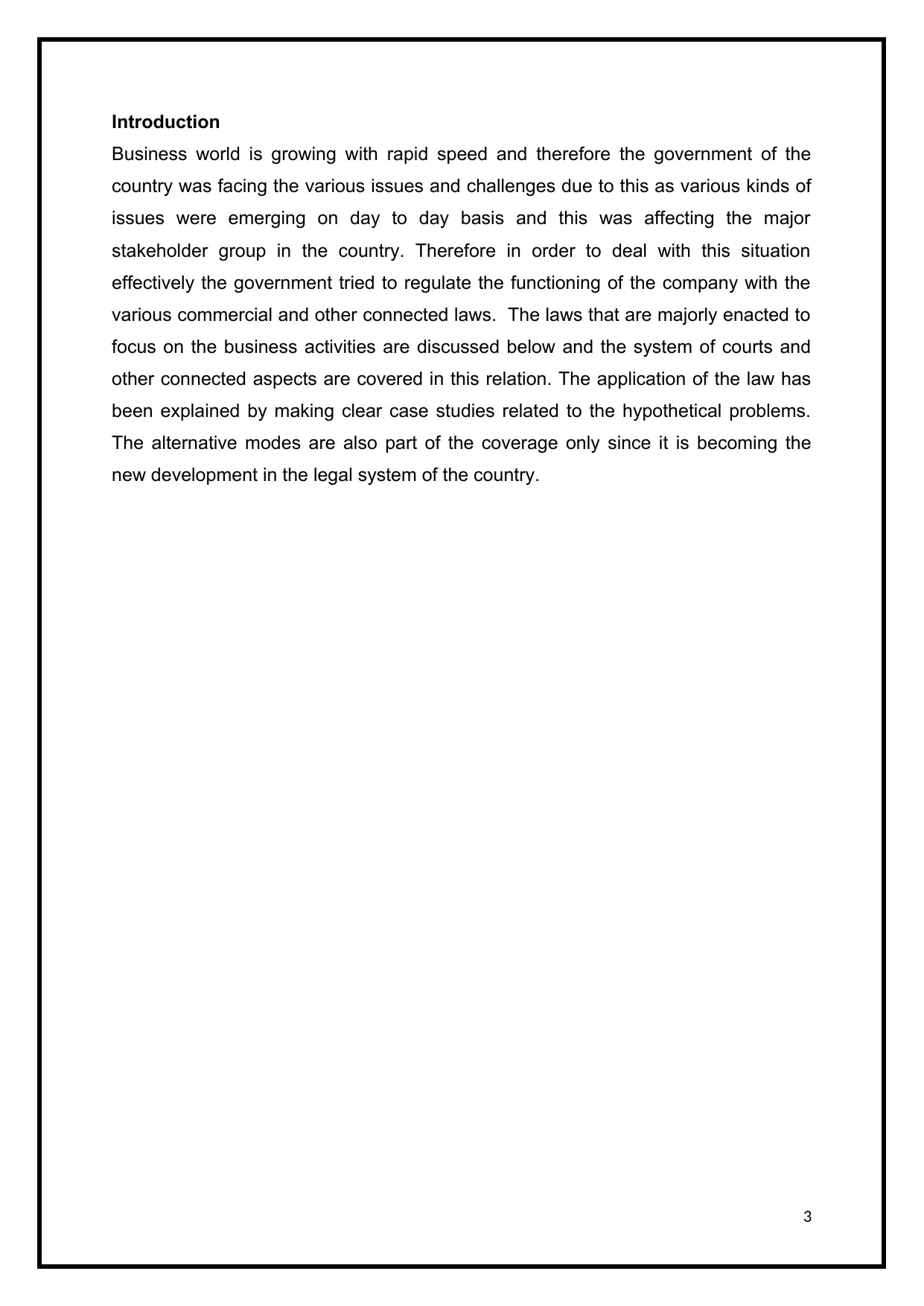
Introduction
Business world is growing with rapid speed and therefore the government of the
country was facing the various issues and challenges due to this as various kinds of
issues were emerging on day to day basis and this was affecting the major
stakeholder group in the country. Therefore in order to deal with this situation
effectively the government tried to regulate the functioning of the company with the
various commercial and other connected laws. The laws that are majorly enacted to
focus on the business activities are discussed below and the system of courts and
other connected aspects are covered in this relation. The application of the law has
been explained by making clear case studies related to the hypothetical problems.
The alternative modes are also part of the coverage only since it is becoming the
new development in the legal system of the country.
3
Business world is growing with rapid speed and therefore the government of the
country was facing the various issues and challenges due to this as various kinds of
issues were emerging on day to day basis and this was affecting the major
stakeholder group in the country. Therefore in order to deal with this situation
effectively the government tried to regulate the functioning of the company with the
various commercial and other connected laws. The laws that are majorly enacted to
focus on the business activities are discussed below and the system of courts and
other connected aspects are covered in this relation. The application of the law has
been explained by making clear case studies related to the hypothetical problems.
The alternative modes are also part of the coverage only since it is becoming the
new development in the legal system of the country.
3
⊘ This is a preview!⊘
Do you want full access?
Subscribe today to unlock all pages.

Trusted by 1+ million students worldwide
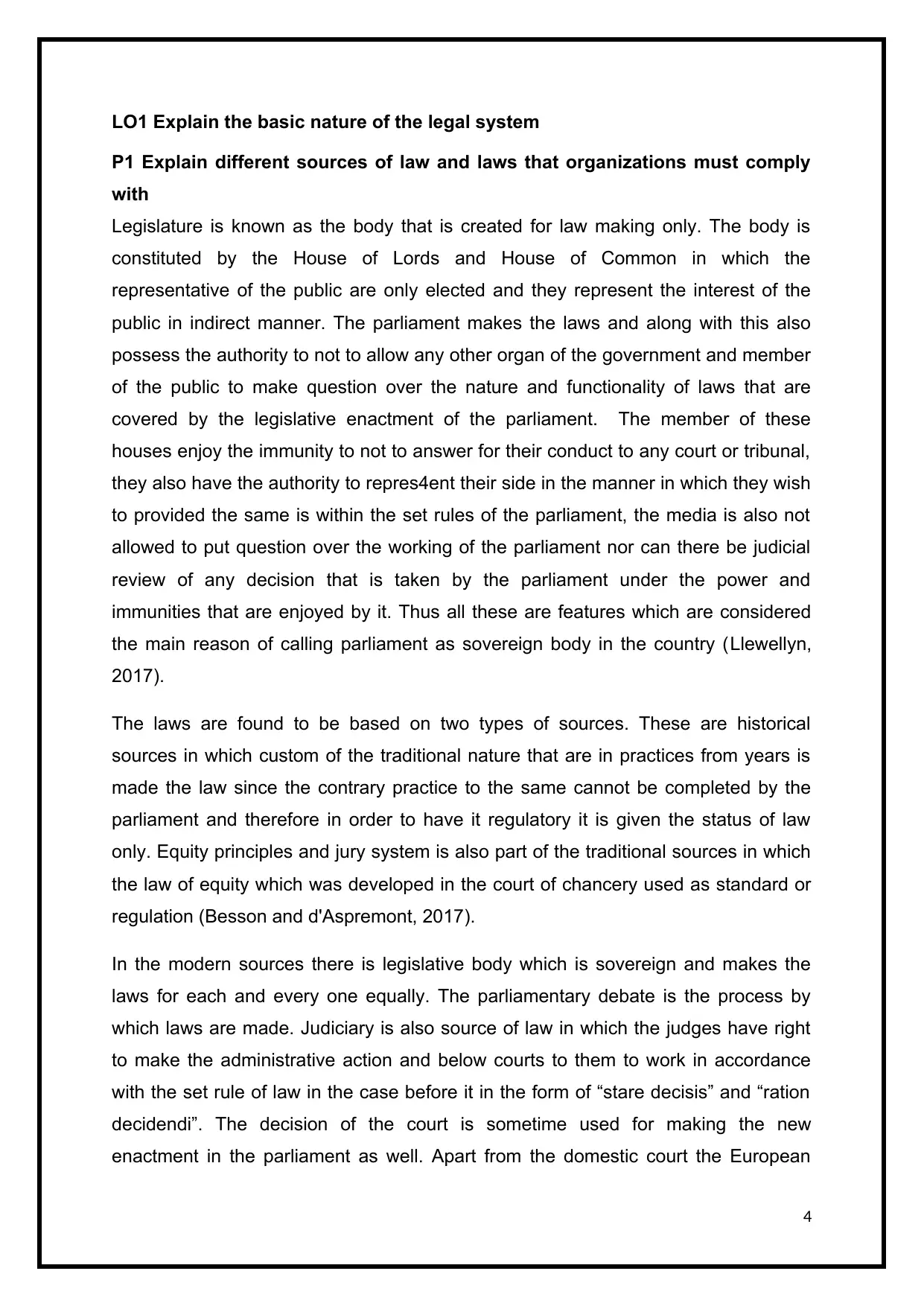
LO1 Explain the basic nature of the legal system
P1 Explain different sources of law and laws that organizations must comply
with
Legislature is known as the body that is created for law making only. The body is
constituted by the House of Lords and House of Common in which the
representative of the public are only elected and they represent the interest of the
public in indirect manner. The parliament makes the laws and along with this also
possess the authority to not to allow any other organ of the government and member
of the public to make question over the nature and functionality of laws that are
covered by the legislative enactment of the parliament. The member of these
houses enjoy the immunity to not to answer for their conduct to any court or tribunal,
they also have the authority to repres4ent their side in the manner in which they wish
to provided the same is within the set rules of the parliament, the media is also not
allowed to put question over the working of the parliament nor can there be judicial
review of any decision that is taken by the parliament under the power and
immunities that are enjoyed by it. Thus all these are features which are considered
the main reason of calling parliament as sovereign body in the country (Llewellyn,
2017).
The laws are found to be based on two types of sources. These are historical
sources in which custom of the traditional nature that are in practices from years is
made the law since the contrary practice to the same cannot be completed by the
parliament and therefore in order to have it regulatory it is given the status of law
only. Equity principles and jury system is also part of the traditional sources in which
the law of equity which was developed in the court of chancery used as standard or
regulation (Besson and d'Aspremont, 2017).
In the modern sources there is legislative body which is sovereign and makes the
laws for each and every one equally. The parliamentary debate is the process by
which laws are made. Judiciary is also source of law in which the judges have right
to make the administrative action and below courts to them to work in accordance
with the set rule of law in the case before it in the form of “stare decisis” and “ration
decidendi”. The decision of the court is sometime used for making the new
enactment in the parliament as well. Apart from the domestic court the European
4
P1 Explain different sources of law and laws that organizations must comply
with
Legislature is known as the body that is created for law making only. The body is
constituted by the House of Lords and House of Common in which the
representative of the public are only elected and they represent the interest of the
public in indirect manner. The parliament makes the laws and along with this also
possess the authority to not to allow any other organ of the government and member
of the public to make question over the nature and functionality of laws that are
covered by the legislative enactment of the parliament. The member of these
houses enjoy the immunity to not to answer for their conduct to any court or tribunal,
they also have the authority to repres4ent their side in the manner in which they wish
to provided the same is within the set rules of the parliament, the media is also not
allowed to put question over the working of the parliament nor can there be judicial
review of any decision that is taken by the parliament under the power and
immunities that are enjoyed by it. Thus all these are features which are considered
the main reason of calling parliament as sovereign body in the country (Llewellyn,
2017).
The laws are found to be based on two types of sources. These are historical
sources in which custom of the traditional nature that are in practices from years is
made the law since the contrary practice to the same cannot be completed by the
parliament and therefore in order to have it regulatory it is given the status of law
only. Equity principles and jury system is also part of the traditional sources in which
the law of equity which was developed in the court of chancery used as standard or
regulation (Besson and d'Aspremont, 2017).
In the modern sources there is legislative body which is sovereign and makes the
laws for each and every one equally. The parliamentary debate is the process by
which laws are made. Judiciary is also source of law in which the judges have right
to make the administrative action and below courts to them to work in accordance
with the set rule of law in the case before it in the form of “stare decisis” and “ration
decidendi”. The decision of the court is sometime used for making the new
enactment in the parliament as well. Apart from the domestic court the European
4
Paraphrase This Document
Need a fresh take? Get an instant paraphrase of this document with our AI Paraphraser
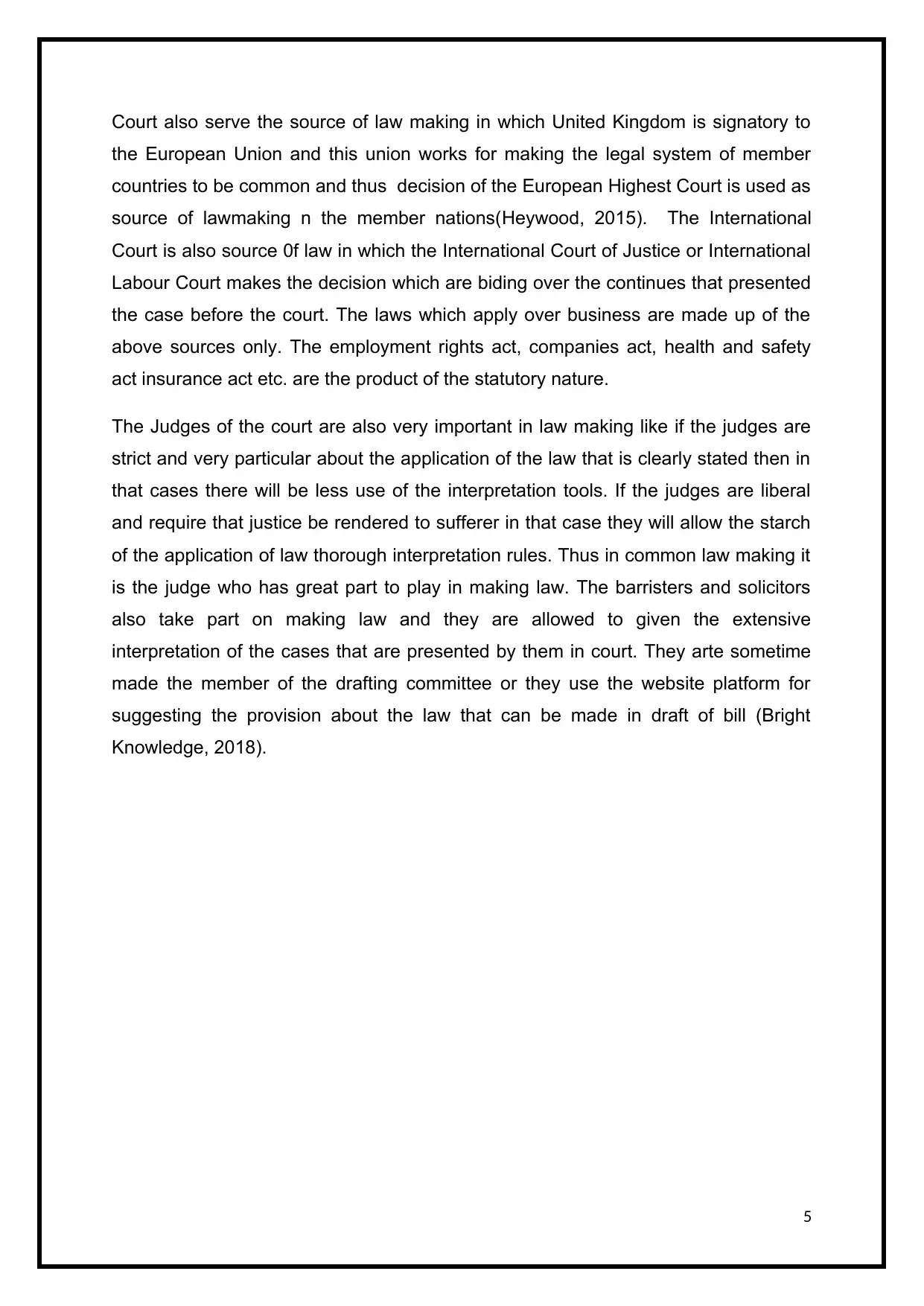
Court also serve the source of law making in which United Kingdom is signatory to
the European Union and this union works for making the legal system of member
countries to be common and thus decision of the European Highest Court is used as
source of lawmaking n the member nations(Heywood, 2015). The International
Court is also source 0f law in which the International Court of Justice or International
Labour Court makes the decision which are biding over the continues that presented
the case before the court. The laws which apply over business are made up of the
above sources only. The employment rights act, companies act, health and safety
act insurance act etc. are the product of the statutory nature.
The Judges of the court are also very important in law making like if the judges are
strict and very particular about the application of the law that is clearly stated then in
that cases there will be less use of the interpretation tools. If the judges are liberal
and require that justice be rendered to sufferer in that case they will allow the starch
of the application of law thorough interpretation rules. Thus in common law making it
is the judge who has great part to play in making law. The barristers and solicitors
also take part on making law and they are allowed to given the extensive
interpretation of the cases that are presented by them in court. They arte sometime
made the member of the drafting committee or they use the website platform for
suggesting the provision about the law that can be made in draft of bill (Bright
Knowledge, 2018).
5
the European Union and this union works for making the legal system of member
countries to be common and thus decision of the European Highest Court is used as
source of lawmaking n the member nations(Heywood, 2015). The International
Court is also source 0f law in which the International Court of Justice or International
Labour Court makes the decision which are biding over the continues that presented
the case before the court. The laws which apply over business are made up of the
above sources only. The employment rights act, companies act, health and safety
act insurance act etc. are the product of the statutory nature.
The Judges of the court are also very important in law making like if the judges are
strict and very particular about the application of the law that is clearly stated then in
that cases there will be less use of the interpretation tools. If the judges are liberal
and require that justice be rendered to sufferer in that case they will allow the starch
of the application of law thorough interpretation rules. Thus in common law making it
is the judge who has great part to play in making law. The barristers and solicitors
also take part on making law and they are allowed to given the extensive
interpretation of the cases that are presented by them in court. They arte sometime
made the member of the drafting committee or they use the website platform for
suggesting the provision about the law that can be made in draft of bill (Bright
Knowledge, 2018).
5
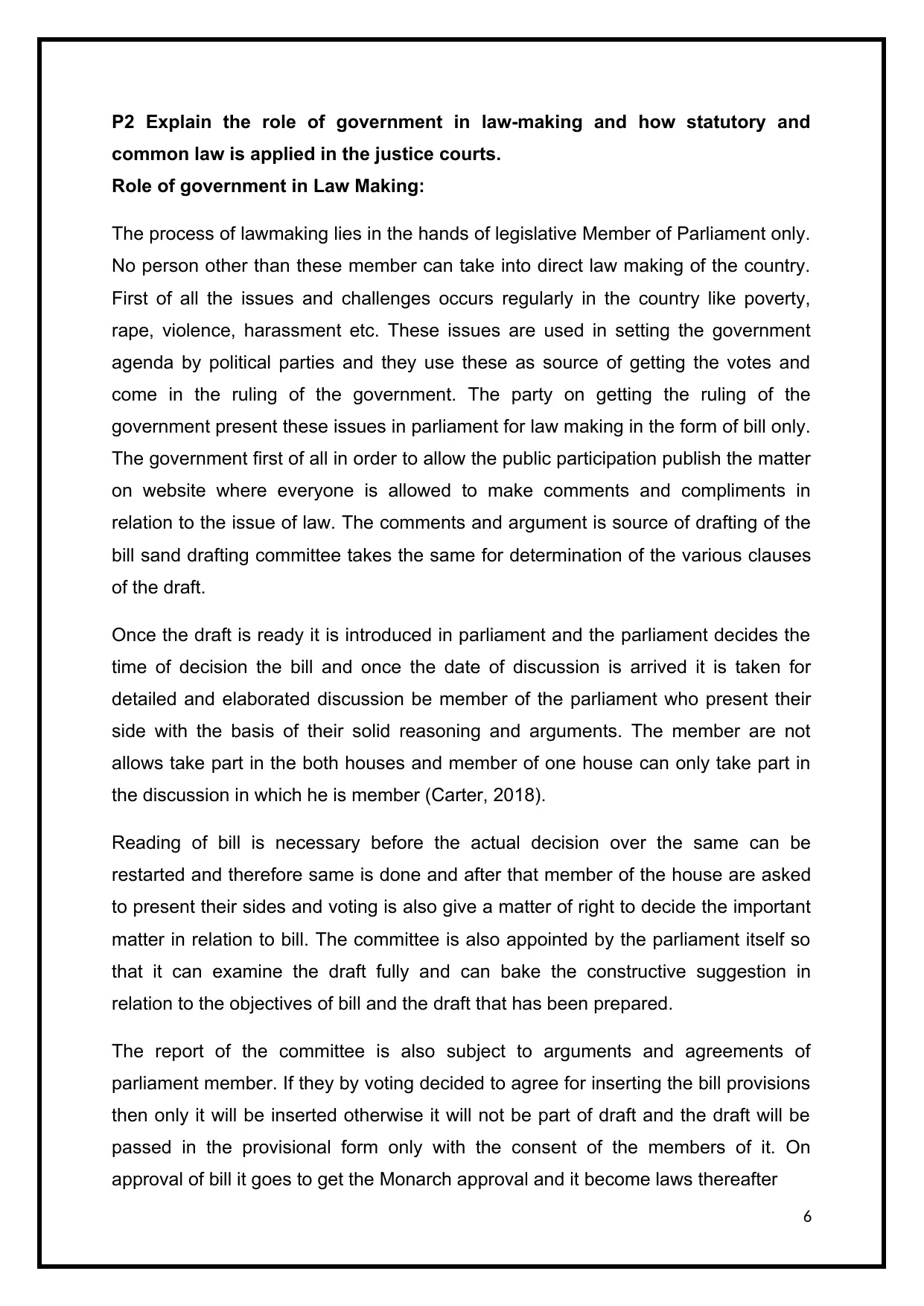
P2 Explain the role of government in law-making and how statutory and
common law is applied in the justice courts.
Role of government in Law Making:
The process of lawmaking lies in the hands of legislative Member of Parliament only.
No person other than these member can take into direct law making of the country.
First of all the issues and challenges occurs regularly in the country like poverty,
rape, violence, harassment etc. These issues are used in setting the government
agenda by political parties and they use these as source of getting the votes and
come in the ruling of the government. The party on getting the ruling of the
government present these issues in parliament for law making in the form of bill only.
The government first of all in order to allow the public participation publish the matter
on website where everyone is allowed to make comments and compliments in
relation to the issue of law. The comments and argument is source of drafting of the
bill sand drafting committee takes the same for determination of the various clauses
of the draft.
Once the draft is ready it is introduced in parliament and the parliament decides the
time of decision the bill and once the date of discussion is arrived it is taken for
detailed and elaborated discussion be member of the parliament who present their
side with the basis of their solid reasoning and arguments. The member are not
allows take part in the both houses and member of one house can only take part in
the discussion in which he is member (Carter, 2018).
Reading of bill is necessary before the actual decision over the same can be
restarted and therefore same is done and after that member of the house are asked
to present their sides and voting is also give a matter of right to decide the important
matter in relation to bill. The committee is also appointed by the parliament itself so
that it can examine the draft fully and can bake the constructive suggestion in
relation to the objectives of bill and the draft that has been prepared.
The report of the committee is also subject to arguments and agreements of
parliament member. If they by voting decided to agree for inserting the bill provisions
then only it will be inserted otherwise it will not be part of draft and the draft will be
passed in the provisional form only with the consent of the members of it. On
approval of bill it goes to get the Monarch approval and it become laws thereafter
6
common law is applied in the justice courts.
Role of government in Law Making:
The process of lawmaking lies in the hands of legislative Member of Parliament only.
No person other than these member can take into direct law making of the country.
First of all the issues and challenges occurs regularly in the country like poverty,
rape, violence, harassment etc. These issues are used in setting the government
agenda by political parties and they use these as source of getting the votes and
come in the ruling of the government. The party on getting the ruling of the
government present these issues in parliament for law making in the form of bill only.
The government first of all in order to allow the public participation publish the matter
on website where everyone is allowed to make comments and compliments in
relation to the issue of law. The comments and argument is source of drafting of the
bill sand drafting committee takes the same for determination of the various clauses
of the draft.
Once the draft is ready it is introduced in parliament and the parliament decides the
time of decision the bill and once the date of discussion is arrived it is taken for
detailed and elaborated discussion be member of the parliament who present their
side with the basis of their solid reasoning and arguments. The member are not
allows take part in the both houses and member of one house can only take part in
the discussion in which he is member (Carter, 2018).
Reading of bill is necessary before the actual decision over the same can be
restarted and therefore same is done and after that member of the house are asked
to present their sides and voting is also give a matter of right to decide the important
matter in relation to bill. The committee is also appointed by the parliament itself so
that it can examine the draft fully and can bake the constructive suggestion in
relation to the objectives of bill and the draft that has been prepared.
The report of the committee is also subject to arguments and agreements of
parliament member. If they by voting decided to agree for inserting the bill provisions
then only it will be inserted otherwise it will not be part of draft and the draft will be
passed in the provisional form only with the consent of the members of it. On
approval of bill it goes to get the Monarch approval and it become laws thereafter
6
⊘ This is a preview!⊘
Do you want full access?
Subscribe today to unlock all pages.

Trusted by 1+ million students worldwide
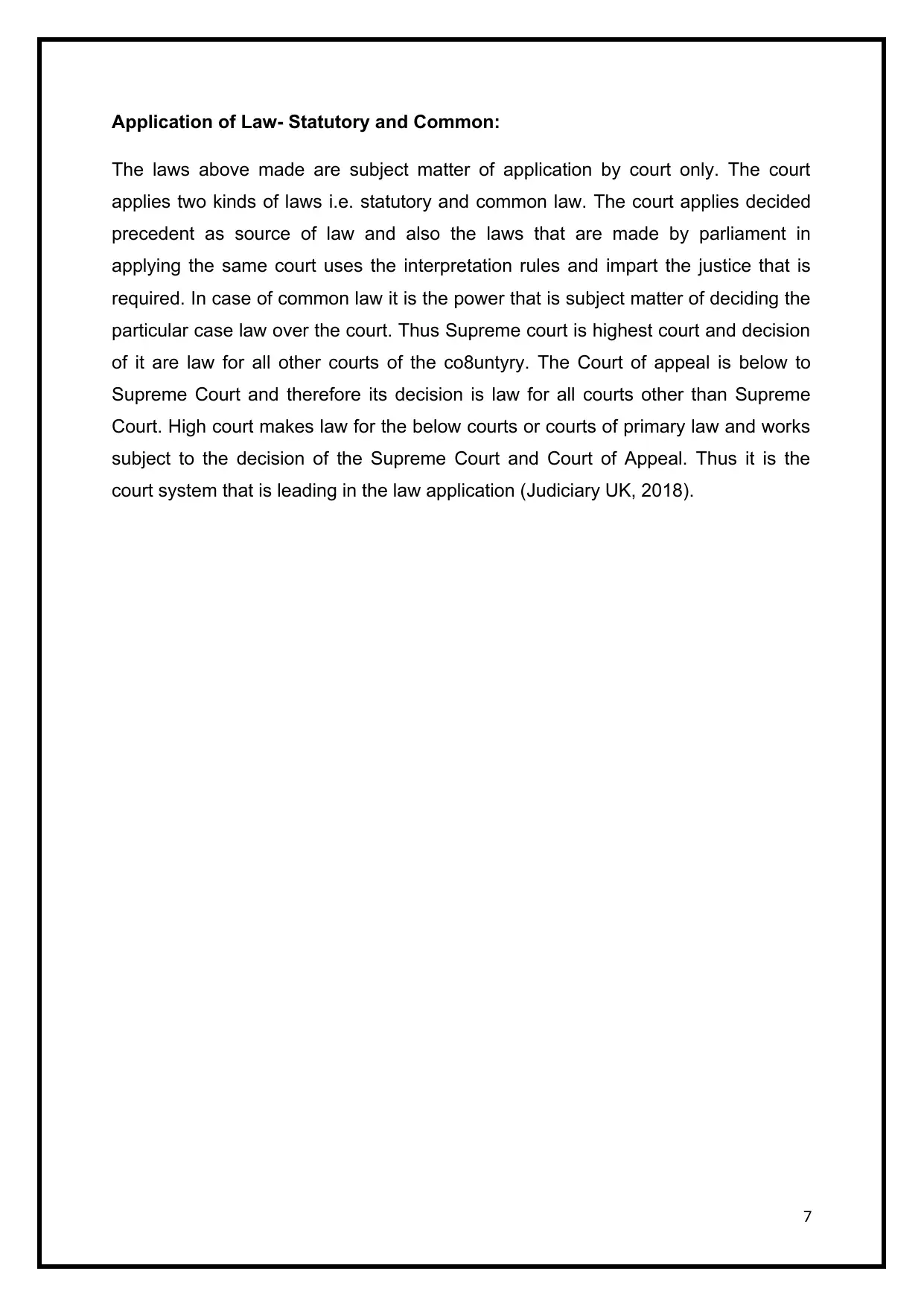
Application of Law- Statutory and Common:
The laws above made are subject matter of application by court only. The court
applies two kinds of laws i.e. statutory and common law. The court applies decided
precedent as source of law and also the laws that are made by parliament in
applying the same court uses the interpretation rules and impart the justice that is
required. In case of common law it is the power that is subject matter of deciding the
particular case law over the court. Thus Supreme court is highest court and decision
of it are law for all other courts of the co8untyry. The Court of appeal is below to
Supreme Court and therefore its decision is law for all courts other than Supreme
Court. High court makes law for the below courts or courts of primary law and works
subject to the decision of the Supreme Court and Court of Appeal. Thus it is the
court system that is leading in the law application (Judiciary UK, 2018).
7
The laws above made are subject matter of application by court only. The court
applies two kinds of laws i.e. statutory and common law. The court applies decided
precedent as source of law and also the laws that are made by parliament in
applying the same court uses the interpretation rules and impart the justice that is
required. In case of common law it is the power that is subject matter of deciding the
particular case law over the court. Thus Supreme court is highest court and decision
of it are law for all other courts of the co8untyry. The Court of appeal is below to
Supreme Court and therefore its decision is law for all courts other than Supreme
Court. High court makes law for the below courts or courts of primary law and works
subject to the decision of the Supreme Court and Court of Appeal. Thus it is the
court system that is leading in the law application (Judiciary UK, 2018).
7
Paraphrase This Document
Need a fresh take? Get an instant paraphrase of this document with our AI Paraphraser
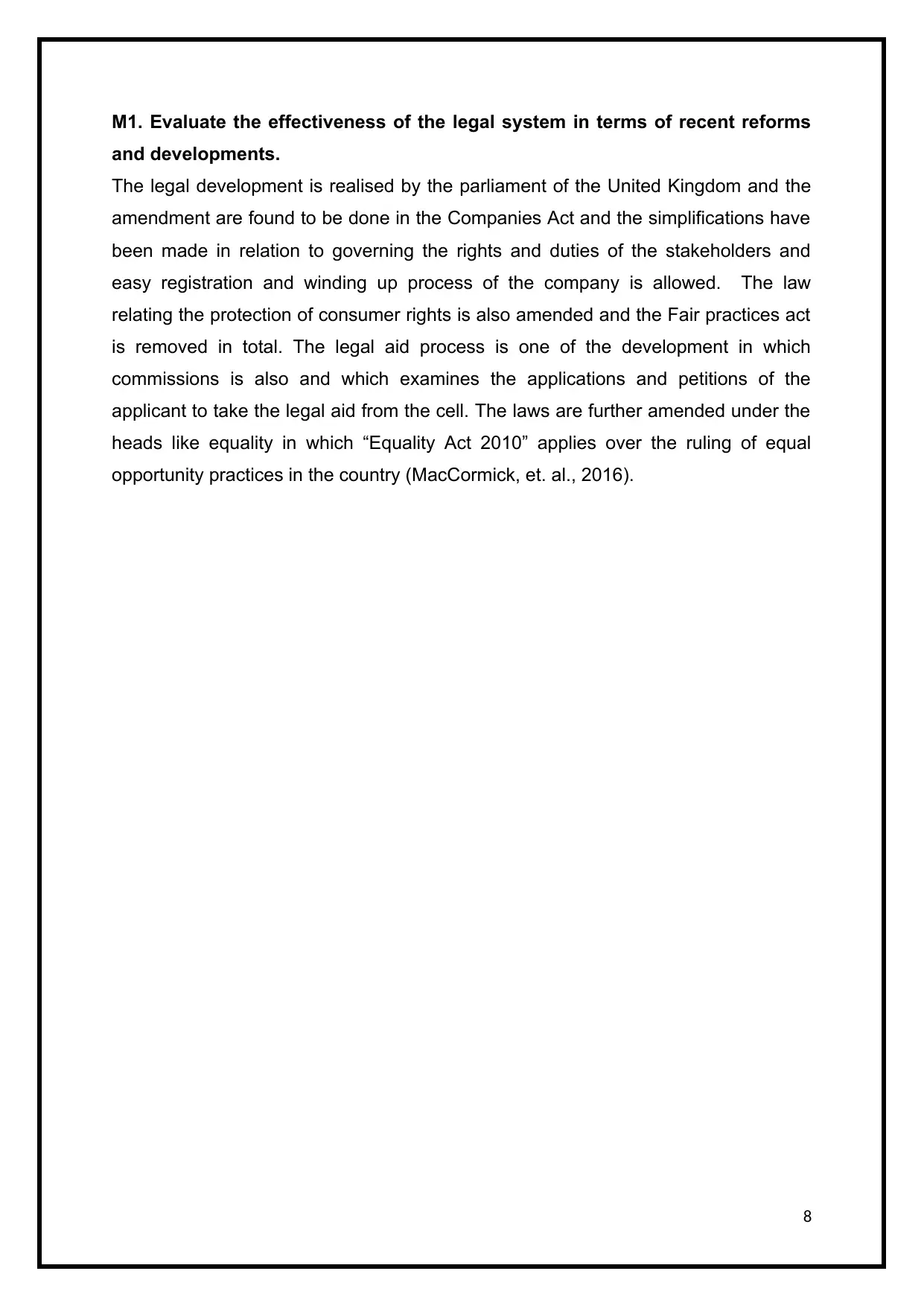
M1. Evaluate the effectiveness of the legal system in terms of recent reforms
and developments.
The legal development is realised by the parliament of the United Kingdom and the
amendment are found to be done in the Companies Act and the simplifications have
been made in relation to governing the rights and duties of the stakeholders and
easy registration and winding up process of the company is allowed. The law
relating the protection of consumer rights is also amended and the Fair practices act
is removed in total. The legal aid process is one of the development in which
commissions is also and which examines the applications and petitions of the
applicant to take the legal aid from the cell. The laws are further amended under the
heads like equality in which “Equality Act 2010” applies over the ruling of equal
opportunity practices in the country (MacCormick, et. al., 2016).
8
and developments.
The legal development is realised by the parliament of the United Kingdom and the
amendment are found to be done in the Companies Act and the simplifications have
been made in relation to governing the rights and duties of the stakeholders and
easy registration and winding up process of the company is allowed. The law
relating the protection of consumer rights is also amended and the Fair practices act
is removed in total. The legal aid process is one of the development in which
commissions is also and which examines the applications and petitions of the
applicant to take the legal aid from the cell. The laws are further amended under the
heads like equality in which “Equality Act 2010” applies over the ruling of equal
opportunity practices in the country (MacCormick, et. al., 2016).
8
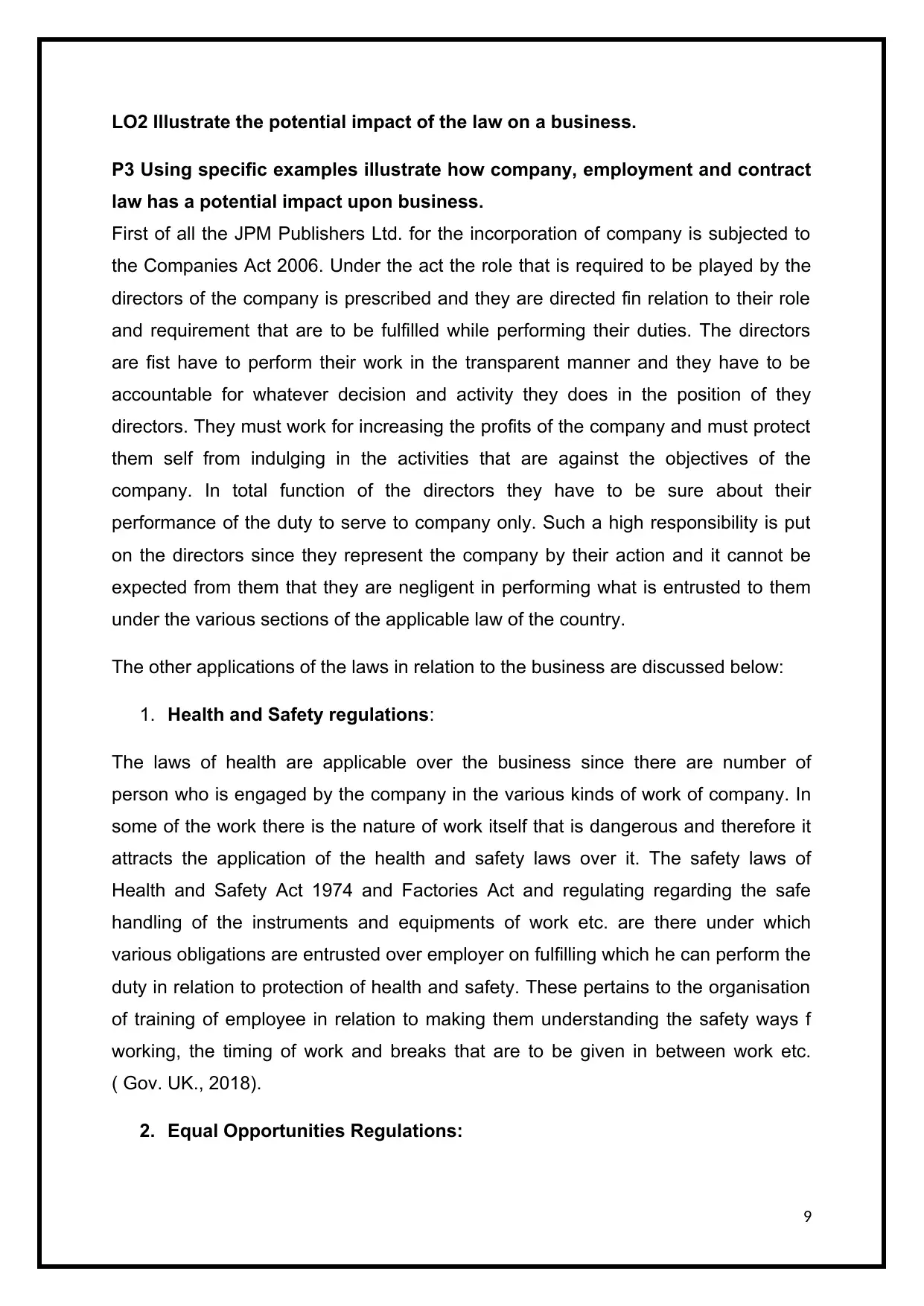
LO2 Illustrate the potential impact of the law on a business.
P3 Using specific examples illustrate how company, employment and contract
law has a potential impact upon business.
First of all the JPM Publishers Ltd. for the incorporation of company is subjected to
the Companies Act 2006. Under the act the role that is required to be played by the
directors of the company is prescribed and they are directed fin relation to their role
and requirement that are to be fulfilled while performing their duties. The directors
are fist have to perform their work in the transparent manner and they have to be
accountable for whatever decision and activity they does in the position of they
directors. They must work for increasing the profits of the company and must protect
them self from indulging in the activities that are against the objectives of the
company. In total function of the directors they have to be sure about their
performance of the duty to serve to company only. Such a high responsibility is put
on the directors since they represent the company by their action and it cannot be
expected from them that they are negligent in performing what is entrusted to them
under the various sections of the applicable law of the country.
The other applications of the laws in relation to the business are discussed below:
1. Health and Safety regulations:
The laws of health are applicable over the business since there are number of
person who is engaged by the company in the various kinds of work of company. In
some of the work there is the nature of work itself that is dangerous and therefore it
attracts the application of the health and safety laws over it. The safety laws of
Health and Safety Act 1974 and Factories Act and regulating regarding the safe
handling of the instruments and equipments of work etc. are there under which
various obligations are entrusted over employer on fulfilling which he can perform the
duty in relation to protection of health and safety. These pertains to the organisation
of training of employee in relation to making them understanding the safety ways f
working, the timing of work and breaks that are to be given in between work etc.
( Gov. UK., 2018).
2. Equal Opportunities Regulations:
9
P3 Using specific examples illustrate how company, employment and contract
law has a potential impact upon business.
First of all the JPM Publishers Ltd. for the incorporation of company is subjected to
the Companies Act 2006. Under the act the role that is required to be played by the
directors of the company is prescribed and they are directed fin relation to their role
and requirement that are to be fulfilled while performing their duties. The directors
are fist have to perform their work in the transparent manner and they have to be
accountable for whatever decision and activity they does in the position of they
directors. They must work for increasing the profits of the company and must protect
them self from indulging in the activities that are against the objectives of the
company. In total function of the directors they have to be sure about their
performance of the duty to serve to company only. Such a high responsibility is put
on the directors since they represent the company by their action and it cannot be
expected from them that they are negligent in performing what is entrusted to them
under the various sections of the applicable law of the country.
The other applications of the laws in relation to the business are discussed below:
1. Health and Safety regulations:
The laws of health are applicable over the business since there are number of
person who is engaged by the company in the various kinds of work of company. In
some of the work there is the nature of work itself that is dangerous and therefore it
attracts the application of the health and safety laws over it. The safety laws of
Health and Safety Act 1974 and Factories Act and regulating regarding the safe
handling of the instruments and equipments of work etc. are there under which
various obligations are entrusted over employer on fulfilling which he can perform the
duty in relation to protection of health and safety. These pertains to the organisation
of training of employee in relation to making them understanding the safety ways f
working, the timing of work and breaks that are to be given in between work etc.
( Gov. UK., 2018).
2. Equal Opportunities Regulations:
9
⊘ This is a preview!⊘
Do you want full access?
Subscribe today to unlock all pages.

Trusted by 1+ million students worldwide
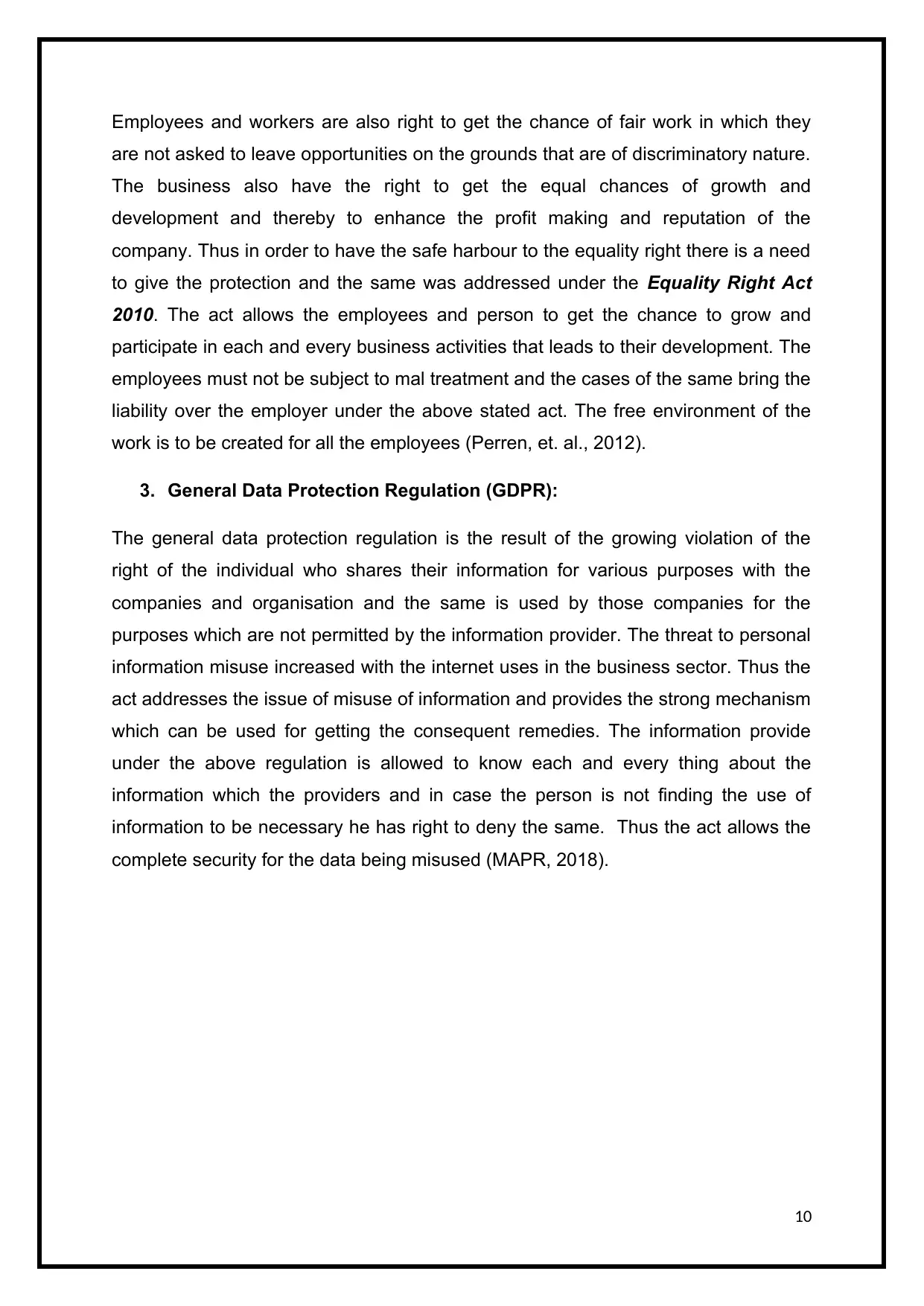
Employees and workers are also right to get the chance of fair work in which they
are not asked to leave opportunities on the grounds that are of discriminatory nature.
The business also have the right to get the equal chances of growth and
development and thereby to enhance the profit making and reputation of the
company. Thus in order to have the safe harbour to the equality right there is a need
to give the protection and the same was addressed under the Equality Right Act
2010. The act allows the employees and person to get the chance to grow and
participate in each and every business activities that leads to their development. The
employees must not be subject to mal treatment and the cases of the same bring the
liability over the employer under the above stated act. The free environment of the
work is to be created for all the employees (Perren, et. al., 2012).
3. General Data Protection Regulation (GDPR):
The general data protection regulation is the result of the growing violation of the
right of the individual who shares their information for various purposes with the
companies and organisation and the same is used by those companies for the
purposes which are not permitted by the information provider. The threat to personal
information misuse increased with the internet uses in the business sector. Thus the
act addresses the issue of misuse of information and provides the strong mechanism
which can be used for getting the consequent remedies. The information provide
under the above regulation is allowed to know each and every thing about the
information which the providers and in case the person is not finding the use of
information to be necessary he has right to deny the same. Thus the act allows the
complete security for the data being misused (MAPR, 2018).
10
are not asked to leave opportunities on the grounds that are of discriminatory nature.
The business also have the right to get the equal chances of growth and
development and thereby to enhance the profit making and reputation of the
company. Thus in order to have the safe harbour to the equality right there is a need
to give the protection and the same was addressed under the Equality Right Act
2010. The act allows the employees and person to get the chance to grow and
participate in each and every business activities that leads to their development. The
employees must not be subject to mal treatment and the cases of the same bring the
liability over the employer under the above stated act. The free environment of the
work is to be created for all the employees (Perren, et. al., 2012).
3. General Data Protection Regulation (GDPR):
The general data protection regulation is the result of the growing violation of the
right of the individual who shares their information for various purposes with the
companies and organisation and the same is used by those companies for the
purposes which are not permitted by the information provider. The threat to personal
information misuse increased with the internet uses in the business sector. Thus the
act addresses the issue of misuse of information and provides the strong mechanism
which can be used for getting the consequent remedies. The information provide
under the above regulation is allowed to know each and every thing about the
information which the providers and in case the person is not finding the use of
information to be necessary he has right to deny the same. Thus the act allows the
complete security for the data being misused (MAPR, 2018).
10
Paraphrase This Document
Need a fresh take? Get an instant paraphrase of this document with our AI Paraphraser
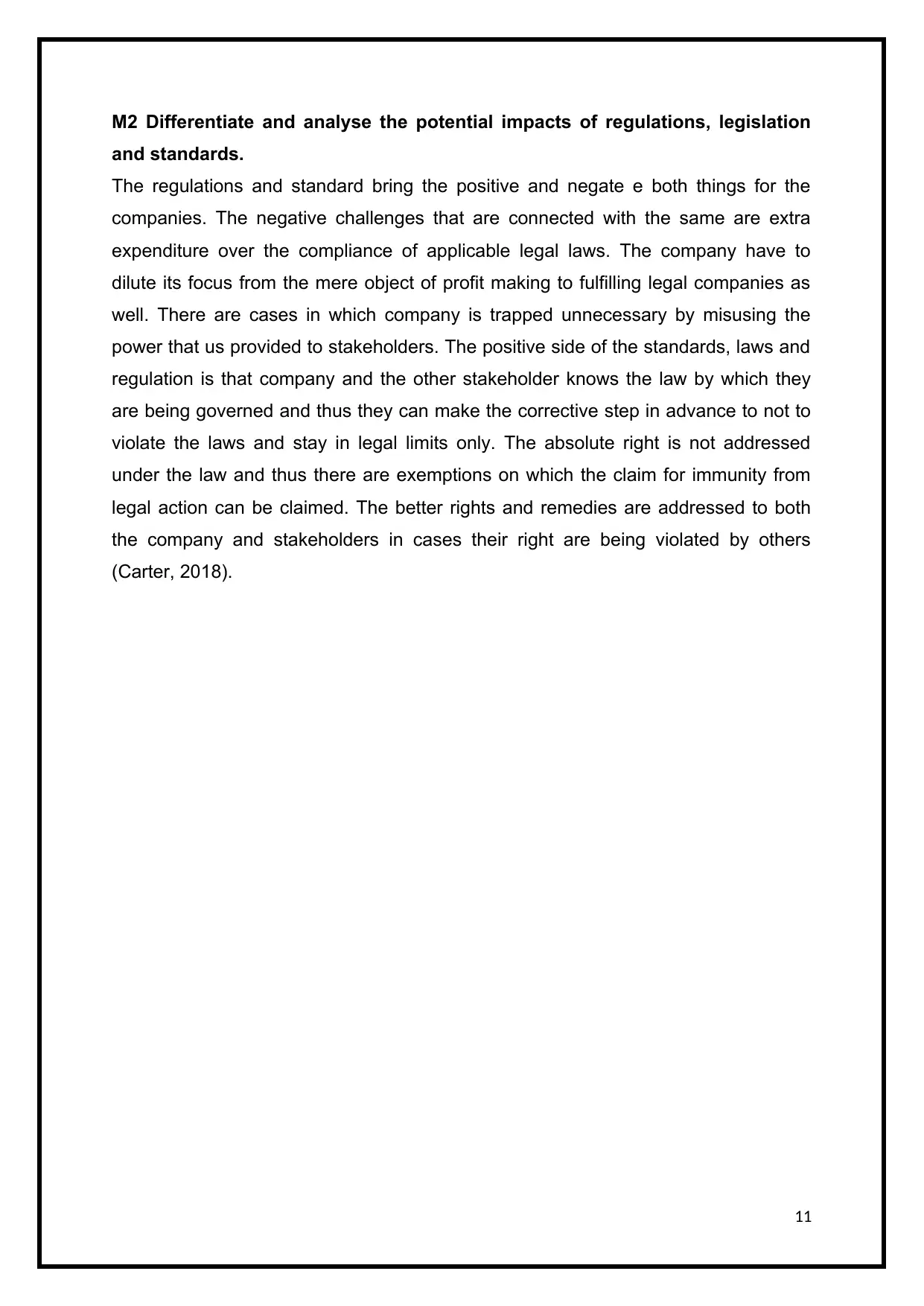
M2 Differentiate and analyse the potential impacts of regulations, legislation
and standards.
The regulations and standard bring the positive and negate e both things for the
companies. The negative challenges that are connected with the same are extra
expenditure over the compliance of applicable legal laws. The company have to
dilute its focus from the mere object of profit making to fulfilling legal companies as
well. There are cases in which company is trapped unnecessary by misusing the
power that us provided to stakeholders. The positive side of the standards, laws and
regulation is that company and the other stakeholder knows the law by which they
are being governed and thus they can make the corrective step in advance to not to
violate the laws and stay in legal limits only. The absolute right is not addressed
under the law and thus there are exemptions on which the claim for immunity from
legal action can be claimed. The better rights and remedies are addressed to both
the company and stakeholders in cases their right are being violated by others
(Carter, 2018).
11
and standards.
The regulations and standard bring the positive and negate e both things for the
companies. The negative challenges that are connected with the same are extra
expenditure over the compliance of applicable legal laws. The company have to
dilute its focus from the mere object of profit making to fulfilling legal companies as
well. There are cases in which company is trapped unnecessary by misusing the
power that us provided to stakeholders. The positive side of the standards, laws and
regulation is that company and the other stakeholder knows the law by which they
are being governed and thus they can make the corrective step in advance to not to
violate the laws and stay in legal limits only. The absolute right is not addressed
under the law and thus there are exemptions on which the claim for immunity from
legal action can be claimed. The better rights and remedies are addressed to both
the company and stakeholders in cases their right are being violated by others
(Carter, 2018).
11
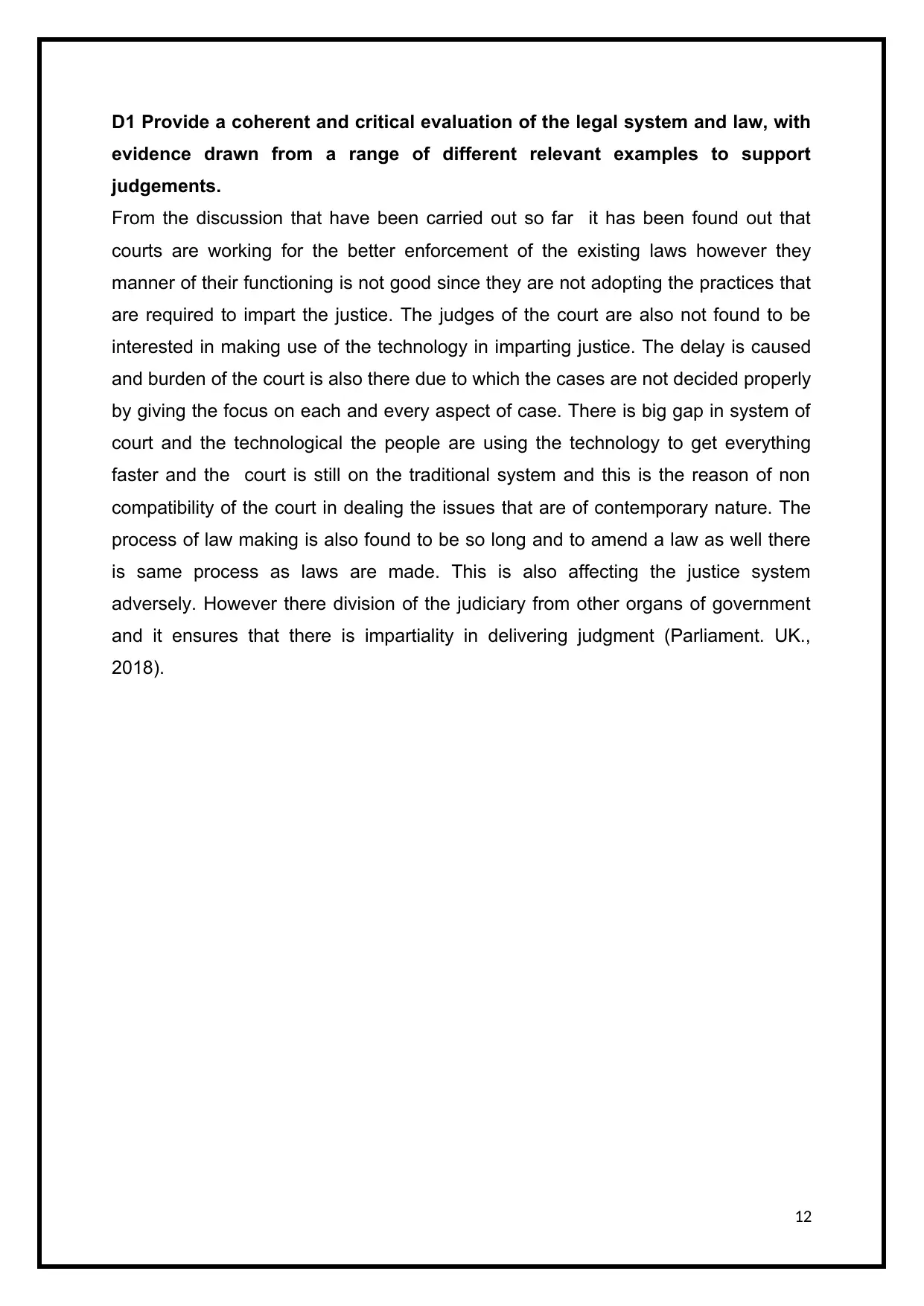
D1 Provide a coherent and critical evaluation of the legal system and law, with
evidence drawn from a range of different relevant examples to support
judgements.
From the discussion that have been carried out so far it has been found out that
courts are working for the better enforcement of the existing laws however they
manner of their functioning is not good since they are not adopting the practices that
are required to impart the justice. The judges of the court are also not found to be
interested in making use of the technology in imparting justice. The delay is caused
and burden of the court is also there due to which the cases are not decided properly
by giving the focus on each and every aspect of case. There is big gap in system of
court and the technological the people are using the technology to get everything
faster and the court is still on the traditional system and this is the reason of non
compatibility of the court in dealing the issues that are of contemporary nature. The
process of law making is also found to be so long and to amend a law as well there
is same process as laws are made. This is also affecting the justice system
adversely. However there division of the judiciary from other organs of government
and it ensures that there is impartiality in delivering judgment (Parliament. UK.,
2018).
12
evidence drawn from a range of different relevant examples to support
judgements.
From the discussion that have been carried out so far it has been found out that
courts are working for the better enforcement of the existing laws however they
manner of their functioning is not good since they are not adopting the practices that
are required to impart the justice. The judges of the court are also not found to be
interested in making use of the technology in imparting justice. The delay is caused
and burden of the court is also there due to which the cases are not decided properly
by giving the focus on each and every aspect of case. There is big gap in system of
court and the technological the people are using the technology to get everything
faster and the court is still on the traditional system and this is the reason of non
compatibility of the court in dealing the issues that are of contemporary nature. The
process of law making is also found to be so long and to amend a law as well there
is same process as laws are made. This is also affecting the justice system
adversely. However there division of the judiciary from other organs of government
and it ensures that there is impartiality in delivering judgment (Parliament. UK.,
2018).
12
⊘ This is a preview!⊘
Do you want full access?
Subscribe today to unlock all pages.

Trusted by 1+ million students worldwide
1 out of 22
Related Documents
Your All-in-One AI-Powered Toolkit for Academic Success.
+13062052269
info@desklib.com
Available 24*7 on WhatsApp / Email
![[object Object]](/_next/static/media/star-bottom.7253800d.svg)
Unlock your academic potential
Copyright © 2020–2026 A2Z Services. All Rights Reserved. Developed and managed by ZUCOL.





